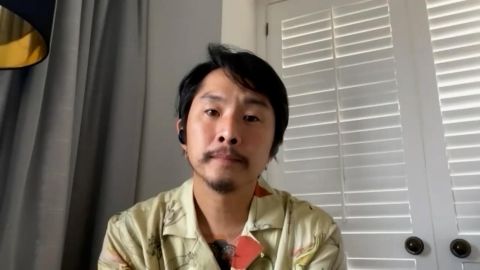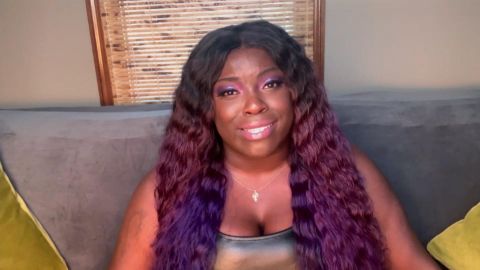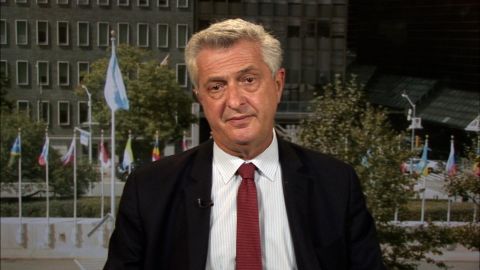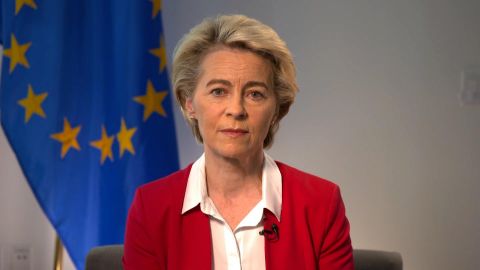Read Transcript EXPAND
CHRISTIANE AMANPOUR: Now, since the end of World War II, half-a-million children have been adopted from abroad by American families, but at least 50 have been deported since 2000. That’s according to the nonprofit Adoptees For Justice. The new film “Blue Bayou” highlights this pressing issue. It was written, directed and stars former “Twilight” actor Justin Chon. It follows a Korean-born adoptee fighting for the only life he’s ever known. And here he is talking to Hari Sreenivasan about the Asian American experience and even representation in Hollywood.
(BEGIN VIDEOTAPE)
HARI SREENIVASAN: Christiane, thanks. Justin Chon, thanks for joining us. So, tell us a little bit about who this character is.
JUSTIN CHON, WRITER/DIRECTOR/ACTOR: Well, the film is about Antonio LeBlanc. He’s an Korean American adoptee. He was brought here when he was 3. And he has a beautiful wife play by Alicia Vikander and a beautiful stepdaughter who’s Caucasian. And during an altercation with his stepdaughter’s father, who is a cop, he gets on ICE’s radar, and tries to fight to stay to be with his family.
SREENIVASAN: What gave you this idea to do an entire film about Korean Americans or at least adoptees that face deportation?
CHON: I have quite a few adoptee friends. And I started hearing that — through the community, that adoptees were being deported. They were brought over here as children when they were very, very young. And they were finding out as adults, 20, 30 years later, that they never had citizenship. These are kids that came over from other countries, brought here by U.S. citizens. And the adoptions were legally acknowledged by the government. So, it was something that was absolutely shocking to me. And I felt a strong need to shine a light on this issue.
SREENIVASAN: You know, it’s interesting, because, obviously, they were children at the time. They didn’t know what paperwork was necessary. But I guess their parents never officially filed for their citizenship? Is that the root cause here?
CHON: There’s a myriad of reasons this happens. But, yes, one of the reasons is, they didn’t fully go through the entire process or some sort of paperwork was left out. I mean, also, mind you, this was — when they were brought here, a lot of them were — it was during the ’70s and 80s. So, it wasn’t as stringent of immigration policy, and the adoption process wasn’t as stringent as it is today. Another thing is, adoption is always talked about through rose-colored glasses. And we don’t talk about how, sometimes, these parents, they bring these children over. And they don’t want them. So, they are put for, you know, adoption again or put to the foster care system. And, you know, if that’s the case, there’s no chance in hell that the parents, you know, proceeded with the whole naturalization process. It’s — you know, if you’ve ever been through that, it’s a very long process. There’s a lot of paperwork involved. And, you know, oftentimes, a lawyer is also involved as well. So, if you’ve been put up and given up again, you know, a lot of times, that’s not going to happen.
SREENIVASAN: There’s a clip in the lawyer’s office and really just the — your character’s wife is talking about how American you are.
(BEGIN VIDEO CLIP)
UNIDENTIFIED FEMALE: He has two kids. I mean, listen to him. Look at him. He’s American.
UNIDENTIFIED MALE: It doesn’t matter what he looks like. It’s immigration policy.
CHON: I was brought here when I was three. I’ve been here over 30 years.
UNIDENTIFIED MALE: Well, sometimes with these international adoptions in the ’80s, the proper paperwork.
CHON: Yes. But like I said, I’ve been here for over 30 years. Can’t you just tell them that I was adopted by white people?
UNIDENTIFIED MALE: I understand your frustration. I really do. But it’s not how it works. Now, here are your options. You can depart voluntarily and have a chance of receiving status or you can stay, and appeal. But if you do that, and the judge doesn’t rule in your favor, you forfeit any opportunity to return to this country.
(END VIDEO CLIP)
SREENIVASAN: It was one of those sort of obvious yet strange scenes that you’re having to prove yourself American.
CHON: Yes. You know, that’s one of the questions that films ask is what is an American? Is it legality or is it birth or is it choice? You know, and it is quite peculiar because, you know, he’s as American as American can be. You know, all of his tattoos are American traditional tattoos. You know, he has a very, you know, Louisiana distinct accent.
(BEGIN VIDEO CLIP)
CHON: He told me I got a letter from my real mom. At first, I didn’t believe him because why would she send me a letter after all that time.
(END VIDEO CLIP)
CHON: But his face is Asian. And I think that this is happening across the country and it’s been happening since the Clinton administration. So, it’s a bipartisan issue. And, you know, it’s a side of immigration policy that were — we haven’t been seeing. You know, a lot of people don’t know this is happening. Most of the time, immigration is about the border and illegal crossings but, you know, nobody thinks to imagine that it would affect adoptees brought here by U.S. citizens.
SREENIVASAN: There’s definitely a very strong kind of fatherhood, parenting connection kind of storyline that goes through this as well. I mean, we find out a little bit more about your character’s background and how difficult it was. Why did you write the character in such a way where, by all means, this guy looks like a pretty good dad to his stepdaughter?
CHON: He’s human. You know, you can — you know, dualities exist in all of us. You know, it’s also a question of, do we deserve second chances? You know, he has a — he’s a flawed human and I did that on purpose because I didn’t want this to be some sort of propaganda piece. You know, I don’t tell anybody what to think and what to believe in this film. I don’t want to say what’s right and wrong. I just present a man’s life and, you know, just show one person’s experience with this process, which means that, you know, he cannot be a perfect person. He does have a criminal record. But he’s trying to mend the past and also become a good father and a good husband. You know, and me, personally, just on a personal level, I have a daughter and, you know, fatherhood is very important to me. And I don’t see why an adoptee couldn’t be a great father. You know, I also think that Antonio, the character, dealing with what he’s dealt with and, you know, having gone through the foster care system, I think he would want to do everything he can to give everything he hasn’t had to his children.
SREENIVASAN: There’s another clip in the film which is early and you’re sitting down for a job interview and you get asked a question that I think almost every immigrant to America has gotten asked at some point. It’s that, where are you from question?
(BEGIN VIDEO CLIP)
UNIDENTIFIED MALE: Antonio LeBlanc. How do you get a last name like that?
CHON: I was adopted.
UNIDENTIFIED MALE: Where you from?
CHON: I’m from (INAUDIBLE) North of Baton Rouge. You know, a small town called St. Francis Villa.
UNIDENTIFIED MALE: Where are you from, like born?
CHON: I see what you mean. I was born in Korea.
UNIDENTIFIED MALE: LeBlanc?
CHON: Yes, sir. Yes. I mean —
UNIDENTIFIED MALE: It says you have two felonies.
CHON: Yes, but they were for non-violent crimes. You know, I wouldn’t hurt nobody.
UNIDENTIFIED MALE: What did you steal?
CHON: You know, I could fix just about anything. You know, I could fix motorcycles, you know, car. Hell, I could fix —
UNIDENTIFIED MALE: What did you steal?
CHON: Motorcycles, you know. But that was a long time ago. You know, if you give me a chance, you know, I could be a real asset to your workplace.
(END VIDEO CLIP)
SREENIVASAN: How often have you, Justin Chon, gotten that question?
CHON: You know, it’s happened like throughout my life. But, you know, growing up, yes. Yes, I heard it quite a bit. And you know, it’s always quite interesting to hear that question because I was born in the United States. I was born in California. And, you know, you say, it’s always a common thing of like, it goes down the line of, you tell where you’re from, what city you’re from. And then, they finally ask, no, no, no. Where are your parents from? But what I do know is, it’s not the question that bugs me. It’s usually depends on the intent. The intention. If it’s meant to alienate, then yes, it’s quite destructive, but if it’s really out of curiosity, then, you know, I do think it’s harmless. You know, I’ve traveled the entire country and I’ve met a lot of people from all over and what I have found is most people are very kind in this country. Most people — and when ignorant things are said sometimes, it’s truly because they’re curious and they just want to know you and they don’t have a common ground.
SREENIVASAN: There’s also an incident that I don’t know if most of the audience would recognize it now, in this particular case, the interaction between the police and your central character, there’s a personal connection there, but how Asian Americans or how Asians in the United States are treated by police, the excessive use of force in the film is not that surprising to some Asian Americans that have lived in this country.
CHON: My dad had a business in Compton. You know, I spent a lot of time there. You know, I was born in Garden Grove. I lived mostly, you know, very nice life, an (INAUDIBLE), middle class life but, you know, a lot of my friends are from Garden Grove, which is, you know, not the best neighborhoods with — also near Anaheim. But, you know, I’ve definitely experienced, you know, police, you know, force and whatnot. But the biggest thing is, is, you know, my family was rooted during the L.A. riots in ’92 and that was, you know, obviously spurred by the Rodney King beating. You know, some people have been asking, how did you time this film so well, you know, because it’s coming right off the heels of, you know, everything that’s happened in the last two years with George Floyd and — there was no timing. It’s always been happening. It’s just that, you know, in 2020, 2021, we have camera phones now that can document these things. Before, you had to be there at the exact perfect time right place and right time with a video camera. But this — you know, the police brutality has been happening for decades. But I’m not saying all cops — as you saw in the film, I’m not saying all cops are bad. You know, Ace, he has a reason for what he does. He really, you know, just wants to be part of his daughter’s life and also, my brother-in-law is a cop. So, you know, it’s just — I’m just reporting on what my, what I see and what my surroundings are and what I find truthful.
SREENIVASAN: Do you think in the time since you’ve started to make the film until now, has the landscape in Hollywood changed much or how so? I mean, because on the one hand, we’ve had kind of the #MeToo movement bring out some of the inequities. On the other hand, we’ve had, you know, some successful films with Asian characters in it that are not just the sort of side role or kind of a supporting actor, buddy comedy kind of things. But I’m curious to see like as an actor and a director, what are you seeing?
CHON: It has changed. You know, there’s still a long way to go, there’s still a lot of work to be done. But, you know, since when I started in the year 2000, it’s definitely — you know, in the last 21 years, it definitely has changed. You know, I’ve been here to witness it. But there’s a sort of chicken and the egg or, you know, sort of a dilemma here because one of the biggest criteria to getting a film financed is having a movie star, a financeable movie star, which means that you can bring in foreign sales and, you know, this whole archaic financial model of filmmaking, I don’t think that applies anymore. You know, I don’t think that applies anymore, but they still hold onto that and it’s — I don’t know. At times, I feel like it can be a systemically racist model because, well, you’re saying that, you know, we cannot cast an Asian as a lead because he’s not financially, you know, viable, but we cannot become financially viable unless we have the opportunities to play the leads. So, I don’t know how to fix that problem. You know, so, it’s slowly happening. And needs to take a miracle. So, you know, like, you get like a Henry Golding that he’s not famous when he’s the lead of a “Crazy Rich Asians.” And then, now, he’s had a certain amount of Box Office success that he is financeable to a certain degree. But you know, that’s not happening very often compared to our white counterparts, and I still think there’s a long way to go because it’s still very, very difficult to have an Asian-led film.
SREENIVASAN: At the end of the film, in the credits, you’ve got images of adoptees that have either been deported or on the verge of being deported. What can be done about this?
CHON: You know, I’m not a politician, obviously. And I’m not — and when it comes to politics, I’m a dummy. I couldn’t tell you how all the primaries and, you know, everything works to getting the president elected. But, you know, I am an artist and made this film to shine a light on this issue and that’s my super power, you know, bringing it to the masses and, you know, hopefully, the right people see it. I’ve partnered with some groups like adoptees for advocacy. And, you know, hopefully, I can — you know, if the right groups approach and right legislators can see the film or it can be presented to them. You know, and what I do know is legislation is about exposure. You know, we need to know there’s a problem for it to be fixed and it needs — there’s so many issues in this country that, you know, which one first? You know, so like the more attention I can draw to it, the more likelihood we can have first some action to take place. That’s what my hope is, is that I just bring enough awareness and then, the experts in D.C. and people who do this type of work can take it from there and I can lend my voice anytime on the emotional level whenever they need me.
SREENIVASAN: The film is called “Blue Bayou.” Justin Chon, thanks so much for joining us.
CHON: Thank you, appreciate it.
About This Episode EXPAND
The United Nations General Assembly week has kicked off in New York. The President of the European Commission and the UN High Commissioner for Refugees each join Christiane to discuss. Plus: Filmmaker and actor Justin Chon discusses his new film “Blue Bayou,” and singer/songwriter Yola explains the inspiration behind her new album “Stand for Myself.”
LEARN MORE



